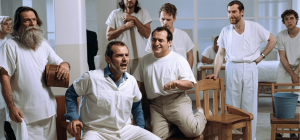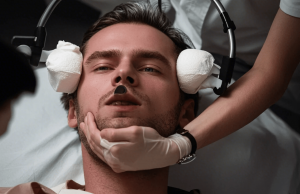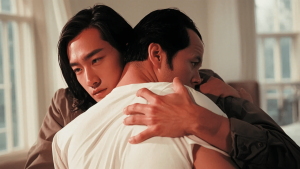One Flew Over the Cuckoo’s Nest (1975) is a drama directed by Milos Forman, based on the novel by Ken Kesey. Set in a psychiatric hospital, the film follows Randle P. McMurphy, a rebellious and charismatic man who fakes insanity to avoid prison time and serve his sentence in a mental institution. Upon arriving, McMurphy quickly becomes a disruptive force, challenging the hospital’s rigid rules and authoritarian staff, especially the cold and calculating Nurse Ratched.
McMurphy’s free-spirited attitude and defiance against authority initially bring him into conflict with Nurse Ratched, who maintains strict control over the ward through manipulation, psychological abuse, and a harsh regime. As McMurphy forms relationships with the other patients, including the shy and withdrawn Chief Bromden, who pretends to be deaf and mute, he begins to inspire them to reclaim some sense of individuality and freedom. His antics, such as organizing a basketball game or attempting to break out of the hospital, offer the other patients a glimpse of what life outside the ward might look like.

However, Nurse Ratched’s power and control over the ward escalate as she becomes determined to break McMurphy’s spirit. She manipulates the system, using electroshock therapy and other methods to punish McMurphy, undermining his rebellious spirit. Despite this, McMurphy continues to challenge her, eventually leading to his lobotomy as a means to neutralize his disruptive influence.

In the final moments of the film, Chief Bromden, inspired by McMurphy’s courage and the way he brought hope to the ward, escapes the hospital by lifting a heavy water tank and throwing it through a window. He flees, symbolizing his newfound freedom and independence, while McMurphy, now a shell of his former self after the lobotomy, remains a tragic victim of the oppressive system.

One Flew Over the Cuckoo’s Nest is a powerful critique of institutionalization, authority, and the loss of individuality. It examines the conflict between conformity and freedom, exploring the dehumanizing effects of psychiatric institutions, and raises questions about the treatment of mental illness. The film is noted for its poignant performances, particularly by Jack Nicholson as McMurphy and Louise Fletcher as Nurse Ratched, and it won five Academy Awards, including Best Picture, Best Director, and Best Actor.
